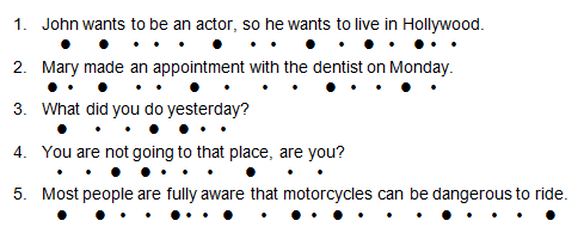Category: Pronunciation
As you know, English is a stressed language. So it’s important to learn how to speak with the same rhythm as a native English speaker.
Rhythm is the sense of movement in speech, which is marked by stress, timing and quantity of syllables. Spoken English words with two or more syllables have different stress and length patterns.
The rhythm of English is based on the contrast of stressed and unstressed syllables in regular intervals, with the stresses falling within content words.
The stressed syllables of the sentence create beats. The beats of the following sentence fall on the words 'like' and the second syllable of 'Colombia'.
Rhythm is the sense of movement in speech, which is marked by stress, timing and quantity of syllables. Spoken English words with two or more syllables have different stress and length patterns.
The rhythm of English is based on the contrast of stressed and unstressed syllables in regular intervals, with the stresses falling within content words.
The stressed syllables of the sentence create beats. The beats of the following sentence fall on the words 'like' and the second syllable of 'Colombia'.
To know whether the words are stressed or not, we can consider the types of words: content and function.
Words that have the most stress in English are called content words. Content words are usually the nouns, verbs, adjectives, adverbs, and pronouns (demonstrative, possessive, reflexive, and interrogative). These words are important to express the main meaning of the sentence.
Nouns: Sam, chair, happiness, etc.
Verbs: read, love, dance, etc.
Adjectives: red, big, strong, etc.
Adverbs: nicely, patiently, equally, yesterday, always, etc.
Negative words: not, never, neither, etc.
Modals: should, could, might, etc. but not will and can.
Yes and No in short answers.
Quantifiers: some, many, no, all, one, two, three, etc.
Wh-Question words.
Function words are those words that are weaker and shorter. They include auxiliary verbs, prepositions, conjunctions, determiners, and possessive adjectives. These words are less important in expressing the meaning of the sentence.
Auxiliary verbs: are, was, has, could, would, etc.
Prepositions: at, on, to, near, etc.
Conjunctions: and, so, but, not, however, etc.
Determiners: a, an, the, some, any, etc.
Pronouns: I, you, she, him, us, ours, etc.
Exercise
Decide which words are function and content words in the following sentences.
Check your answers below:
Exercise Answers. Content words are in bold and the stressed syllables are in capital letters.
Words that have the most stress in English are called content words. Content words are usually the nouns, verbs, adjectives, adverbs, and pronouns (demonstrative, possessive, reflexive, and interrogative). These words are important to express the main meaning of the sentence.
Nouns: Sam, chair, happiness, etc.
Verbs: read, love, dance, etc.
Adjectives: red, big, strong, etc.
Adverbs: nicely, patiently, equally, yesterday, always, etc.
Negative words: not, never, neither, etc.
Modals: should, could, might, etc. but not will and can.
Yes and No in short answers.
Quantifiers: some, many, no, all, one, two, three, etc.
Wh-Question words.
Function words are those words that are weaker and shorter. They include auxiliary verbs, prepositions, conjunctions, determiners, and possessive adjectives. These words are less important in expressing the meaning of the sentence.
Auxiliary verbs: are, was, has, could, would, etc.
Prepositions: at, on, to, near, etc.
Conjunctions: and, so, but, not, however, etc.
Determiners: a, an, the, some, any, etc.
Pronouns: I, you, she, him, us, ours, etc.
Exercise
Decide which words are function and content words in the following sentences.
- John wants to be an actor, so he wants to live in Hollywood.
- Mary made an appointment with the dentist on Monday.
- What did you do yesterday?
- You are not going to that place, are you?
- Most people are fully aware that motorcycles can be dangerous to ride.
Check your answers below:
Exercise Answers. Content words are in bold and the stressed syllables are in capital letters.
- John wants to be an ACtor, so he wants to live in HOllywood.
- MAry made an apPOINTment with the DENtist on MONday.
- What did you do YESterday?
- You are not GOing to that place, are you?
- Most PEOple are FULly aWARE that MOtorCYcles can be DANgerous to ride.
Now practice your English rhythm.
| English pronunciation - Rhythm exercise |
What to read next






